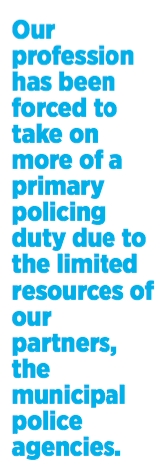
Features
Back of the Book
Opinion
The changing role of an Ontario special constable
If you were to ask one out of every 10 Torontonians what a special constable is, I’m sure the answer would sound along the lines of: “I have no idea,” or, “The police?”
September 7, 2017 By David Moskowitz

In 2014, the Toronto Transit Commission (TTC) hired me as a special constable, which granted me the limited authority of a peace officer under the Criminal Code of Canada (CCC), and, in most cases, limited powers under the Ontario Provincial Offences Act (POA).
I came to see the general public only understood the role of the word “police” and any variation of that word could easily become lost in translation. So I developed a very specific answer to help them out: “a special constable is granted the authority of a police officer while on the property of the TTC.”
You have to embrace the complicated role of a special constable — given the authority of a peace officer but with the restrictions set out in an agreement between the organization and the Police Services Board. This agreement ensures special constables are adhering to their specific legal authorities. In the CCC, a peace officer is granted authority from Section 495, which relates to their powers of arrest and the ability to arrest without warrant. As a special constable, you are deemed a peace officer — for limited sections of the CCC — and you are deemed a police officer — but only for specific sections of the POA.
This is where it gets tricky — not being allowed to identify as a “police officer,” but still being able to professionally assist the people you have sworn an oath to protect.
We resemble police officers in appearance but have limited resources to make arrests and conduct investigations. Special constables were not initially meant to conduct primary policing, but today, our profession has been forced to take on more of this duty due to the limited resources of our partners, the municipal police agencies, and in most cases, we are the first responders on our organizations’ properties.
Special constables have the same values as the police. Alberta has acknowledged this by naming their special constables as peace officers and I think this term is more conducive to our position and authority.
Special constabulary in Ontario has evolved into a very important and much needed profession. We protect the most vulnerable soft targets, including the courts, transit, housing, universities and parks. We are regulated by their employers, the sponsoring police agencies, and fall subject to being examined by not only the Ontario Independent Police Review Board but also by the Ombudsman and Special Investigations Unit. We have to abide by the same regulations as our counterparts in the police services, yet don’t receive the backing of the Police Services Act (PSA).
We have also been excluded from Bill 163, which seeks to amend the Workplace Safety and Insurance Act. I have requested that the Ministry of Labour amend this bill to include us. This would entitle members of special constable agencies to benefits under the act for post-traumatic stress disorder (PTSD).
Additionally, the Ministry of Community Safety and Correctional Services is also currently conducting “Strategy for a Safer Ontario,” a review of the PSA. Special constables form part of this review and we are hoping for more educational requirements as well as standardized training and powers instituted by the ministry, rather than each police agency.
Being a special constable, you are constantly reminded that you are “not the police” and I agree that I am not what society deems a “police officer,” but I am the person that will protect those in danger and help those in need. That is something.
David Moskowitz is currently the president of the Ontario Special Constable Association, a role he has served since 2015. He has also been a transit special constable with the TTC for the past three years. Reach him at president@specialconstables.ca.
Print this page